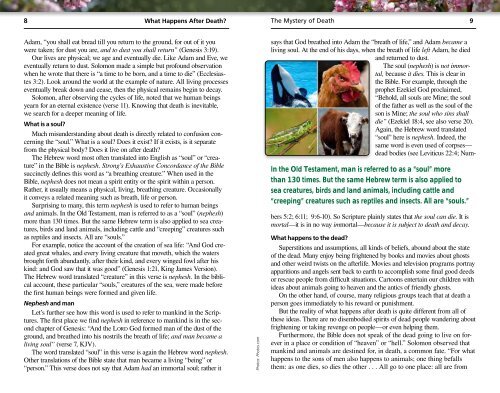what-happens-after-death
what-happens-after-death
what-happens-after-death
Create successful ePaper yourself
Turn your PDF publications into a flip-book with our unique Google optimized e-Paper software.
8 What Happens After Death? The Mystery of Death9Adam, “you shall eat bread till you return to the ground, for out of it youwere taken; for dust you are, and to dust you shall return” (Genesis 3:19).Our lives are physical; we age and eventually die. Like Adam and Eve, weeventually return to dust. Solomon made a simple but profound observationwhen he wrote that there is “a time to be born, and a time to die” (Ecclesiastes3:2). Look around the world at the example of nature. All living processeseventually break down and cease, then the physical remains begin to decay.Solomon, <strong>after</strong> observing the cycles of life, noted that we human beingsyearn for an eternal existence (verse 11). Knowing that <strong>death</strong> is inevitable,we search for a deeper meaning of life.What is a soul?Much misunderstanding about <strong>death</strong> is directly related to confusion concerningthe “soul.” What is a soul? Does it exist? If it exists, is it separatefrom the physical body? Does it live on <strong>after</strong> <strong>death</strong>?The Hebrew word most often translated into English as “soul” or “creature”in the Bible is nephesh. Strong’s Exhaustive Concordance of the Biblesuccinctly defines this word as “a breathing creature.” When used in theBible, nephesh does not mean a spirit entity or the spirit within a person.Rather, it usually means a physical, living, breathing creature. Occasionallyit conveys a related meaning such as breath, life or person.Surprising to many, this term nephesh is used to refer to human beingsand animals. In the Old Testament, man is referred to as a “soul” (nephesh)more than 130 times. But the same Hebrew term is also applied to sea creatures,birds and land animals, including cattle and “creeping” creatures suchas reptiles and insects. All are “souls.”For example, notice the account of the creation of sea life: “And God createdgreat whales, and every living creature that moveth, which the watersbrought forth abundantly, <strong>after</strong> their kind, and every winged fowl <strong>after</strong> hiskind: and God saw that it was good” (Genesis 1:21, King James Version).The Hebrew word translated “creature” in this verse is nephesh. In the biblicalaccount, these particular “souls,” creatures of the sea, were made beforethe first human beings were formed and given life.Nephesh and manLet’s further see how this word is used to refer to mankind in the Scriptures.The first place we find nephesh in reference to mankind is in the secondchapter of Genesis: “And the Lor d God formed man of the dust of theground, and breathed into his nostrils the breath of life; and man became aliving soul” (verse 7, KJV).The word translated “soul” in this verse is again the Hebrew word nephesh.Other translations of the Bible state that man became a living “being” or“person.” This verse does not say that Adam had an immortal soul; rather itPhotos: Photos.comIn the Old Testament, man is referred to as a “soul” morethan 130 times. But the same Hebrew term is also applied tosea creatures, birds and land animals, including cattle and“creeping” creatures such as reptiles and insects. All are “souls.”says that God breathed into Adam the “breath of life,” and Adam became aliving soul. At the end of his days, when the breath of life left Adam, he diedand returned to dust.The soul (nephesh) is not immortal,because it dies. This is clear inthe Bible. For example, through theprophet Ezekiel God proclaimed,“Behold, all souls are Mine; the soulof the father as well as the soul of theson is Mine; the soul who sins shalldie” (Ezekiel 18:4, see also verse 20).Again, the Hebrew word translated“soul” here is nephesh. Indeed, thesame word is even used of corpses—dead bodies (see Leviticus 22:4; Numbers5:2; 6:11; 9:6-10). So Scripture plainly states that the soul can die. It ismortal—it is in no way immortal—because it is subject to <strong>death</strong> and decay.What <strong>happens</strong> to the dead?Superstitions and assumptions, all kinds of beliefs, abound about the stateof the dead. Many enjoy being frightened by books and movies about ghostsand other weird twists on the <strong>after</strong>life. Movies and television programs portrayapparitions and angels sent back to earth to accomplish some final good deedsor rescue people from difficult situations. Cartoons entertain our children withideas about animals going to heaven and the antics of friendly ghosts.On the other hand, of course, many religious groups teach that at <strong>death</strong> aperson goes immediately to his reward or punishment.But the reality of <strong>what</strong> <strong>happens</strong> <strong>after</strong> <strong>death</strong> is quite different from all ofthese ideas. There are no disembodied spirits of dead people wandering aboutfrightening or taking revenge on people—or even helping them.Furthermore, the Bible does not speak of the dead going to live on foreverin a place or condition of “heaven” or “hell.” Solomon observed thatmankind and animals are destined for, in <strong>death</strong>, a common fate. “For <strong>what</strong><strong>happens</strong> to the sons of men also <strong>happens</strong> to animals; one thing befallsthem: as one dies, so dies the other . . . All go to one place: all are from


